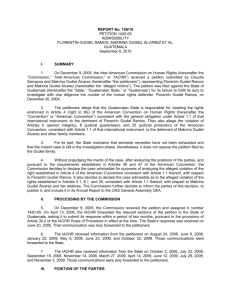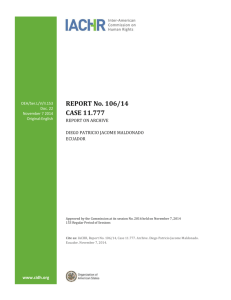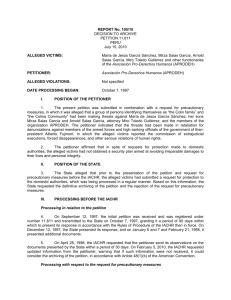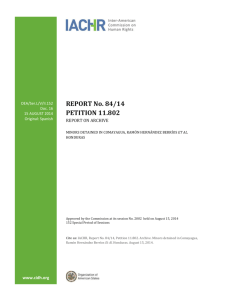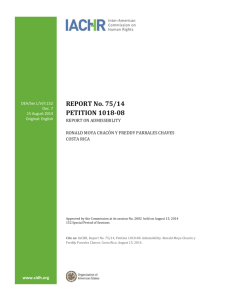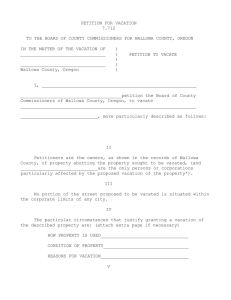Report No. 107/10
advertisement
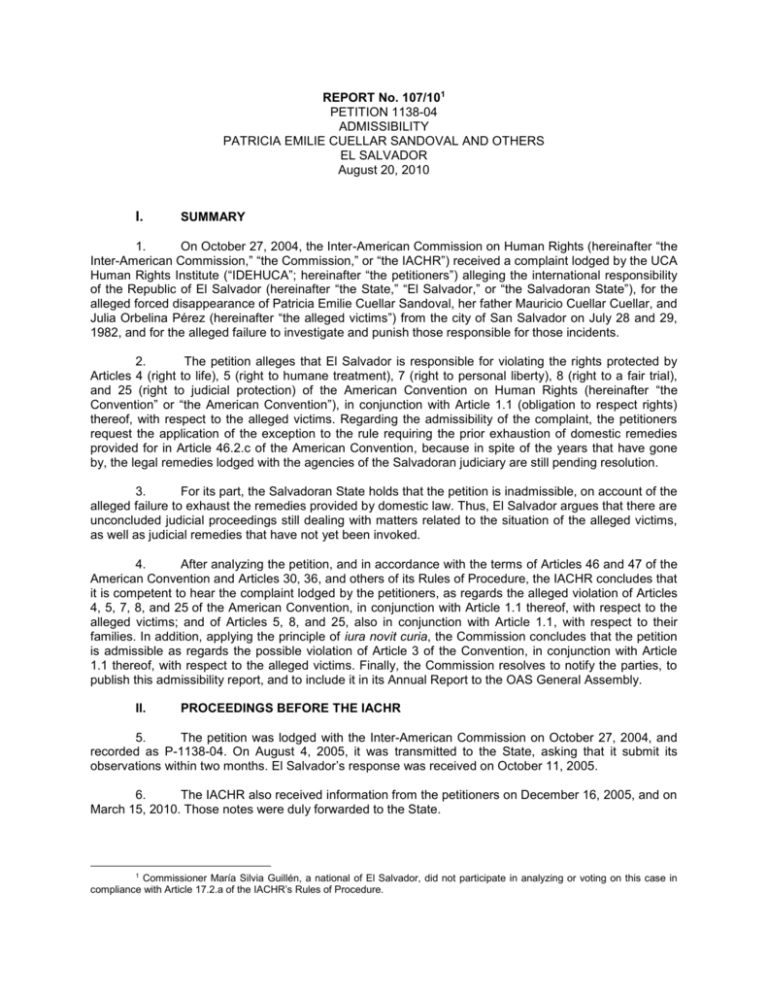
REPORT No. 107/101 PETITION 1138-04 ADMISSIBILITY PATRICIA EMILIE CUELLAR SANDOVAL AND OTHERS EL SALVADOR August 20, 2010 I. SUMMARY 1. On October 27, 2004, the Inter-American Commission on Human Rights (hereinafter “the Inter-American Commission,” “the Commission,” or “the IACHR”) received a complaint lodged by the UCA Human Rights Institute (“IDEHUCA”; hereinafter “the petitioners”) alleging the international responsibility of the Republic of El Salvador (hereinafter “the State,” “El Salvador,” or “the Salvadoran State”), for the alleged forced disappearance of Patricia Emilie Cuellar Sandoval, her father Mauricio Cuellar Cuellar, and Julia Orbelina Pérez (hereinafter “the alleged victims”) from the city of San Salvador on July 28 and 29, 1982, and for the alleged failure to investigate and punish those responsible for those incidents. 2. The petition alleges that El Salvador is responsible for violating the rights protected by Articles 4 (right to life), 5 (right to humane treatment), 7 (right to personal liberty), 8 (right to a fair trial), and 25 (right to judicial protection) of the American Convention on Human Rights (hereinafter “the Convention” or “the American Convention”), in conjunction with Article 1.1 (obligation to respect rights) thereof, with respect to the alleged victims. Regarding the admissibility of the complaint, the petitioners request the application of the exception to the rule requiring the prior exhaustion of domestic remedies provided for in Article 46.2.c of the American Convention, because in spite of the years that have gone by, the legal remedies lodged with the agencies of the Salvadoran judiciary are still pending resolution. 3. For its part, the Salvadoran State holds that the petition is inadmissible, on account of the alleged failure to exhaust the remedies provided by domestic law. Thus, El Salvador argues that there are unconcluded judicial proceedings still dealing with matters related to the situation of the alleged victims, as well as judicial remedies that have not yet been invoked. 4. After analyzing the petition, and in accordance with the terms of Articles 46 and 47 of the American Convention and Articles 30, 36, and others of its Rules of Procedure, the IACHR concludes that it is competent to hear the complaint lodged by the petitioners, as regards the alleged violation of Articles 4, 5, 7, 8, and 25 of the American Convention, in conjunction with Article 1.1 thereof, with respect to the alleged victims; and of Articles 5, 8, and 25, also in conjunction with Article 1.1, with respect to their families. In addition, applying the principle of iura novit curia, the Commission concludes that the petition is admissible as regards the possible violation of Article 3 of the Convention, in conjunction with Article 1.1 thereof, with respect to the alleged victims. Finally, the Commission resolves to notify the parties, to publish this admissibility report, and to include it in its Annual Report to the OAS General Assembly. II. PROCEEDINGS BEFORE THE IACHR 5. The petition was lodged with the Inter-American Commission on October 27, 2004, and recorded as P-1138-04. On August 4, 2005, it was transmitted to the State, asking that it submit its observations within two months. El Salvador’s response was received on October 11, 2005. 6. The IACHR also received information from the petitioners on December 16, 2005, and on March 15, 2010. Those notes were duly forwarded to the State. 1 Commissioner María Silvia Guillén, a national of El Salvador, did not participate in analyzing or voting on this case in compliance with Article 17.2.a of the IACHR’s Rules of Procedure. 2 7. For it parts, the State sent additional communications on February 24, 2006, and on June 14, 2010, which were duly forwarded to the petitioners. III. POSITIONS OF THE PARTIES A. The petitioners 8. According to the petitioners’ claims, Patricia Emilie Cuellar Sandoval disappeared from the city of San Salvador on July 28, 1982, while Mauricio Cuellar Cuellar, her father, and Julia Orbelina Pérez, who had been a domestic employee in Mr. Cuellar’s home for one month and 20 days, were abducted from his home (also located in the city of San Salvador) later that same day or in the early hours of the next, July 29, 1982. They claim that the case is surrounded by grave impunity, in that the legal proceedings later brought before the competent authorities are still pending resolution. 9. The petitioners state that the alleged victims’ forced disappearances took place against a backdrop of persecution and systematic violence that, during El Salvador’s internal armed conflict (1980 to 1991), was pursued against any person who held a position contrary to that of the ruling regime. In particular, they maintain that the forced disappearance of persons was a systematic practice, carried out by state agents – or by private citizens acting with their acquiescence – with absolute impunity, with respect to which the agencies of the administration of justice took no action because they were not independent from the other branches of government. They claim that between 1980 and 1991, more than 8,000 forced disappearances took place.2 10. Specifically, the petitioners claim that Patricia Emilie Cuellar Sandoval had been an active participant in Christian movements of the Catholic Church since 1975, and that since 1978 she had been persecuted by agents of the State. They contend that this persecution worsened in 1980, after the offices of Socorro Jurídico Cristiano (“Christian Legal Assistance”),3 where Mrs. Cuellar Sandoval worked, were raided and ransacked by members of the Salvadoran security forces and military on July 5, 1980, and after which the National Police issued a report calling all the employees of that office “subversives.” In addition, they report that in April 1981, troops raided and searched the alleged victim’s home and that, failing to find her there, they then went to her father’s house, where they asked after her in a threatening fashion. Finally, they state that on July 27, 1982, one day before her disappearance, the alleged victim was followed by members of the security forces while in her car, a situation that she reported to the offices of Socorro Jurídico Cristiano. They assert that on July 28, 1982, the alleged victim took her children Maité María (aged 3 years), Javier Ernesto (2½ years), and Ana Gabriela (8 months) to the kindergarten they attended in the city of San Salvador, and that she never returned to pick them up. They claim that since then, her whereabouts has remained unknown. 11. The petitioners further state that during that night, during the curfew, a group of 20 men – who, on account of their weapons and uniforms, could be identified as members of the Salvadoran armed forces – ransacked the alleged victim’s apartment and seized personal documents and items of her property, including her vehicle. 12. With reference to Mauricio Cuellar Cuellar, the petitioners report that at the time of the incident, he was the general manager of the Salvadoran Industrialists’ Association. They claim that on July 28, 1982, after collecting Patricia Cuellar’s children (his grandchildren) from their kindergarten, he began taking steps to discover his daughter’s whereabouts. Thus, from his home in San Salvador’s Escalón district, he telephoned various relatives and family friends until at least 10:00 p.m. They claim that some time between then and the early hours of July 29, 1982, Mauricio Cuellar Cuellar and Julia Orbelina Pérez were violently abducted from the house. They report that on the morning of July 29, Mr. 2 The petitioners also claim that during the Salvadoran Civil War, 75,000 extrajudicial killings of noncombatant members of the civilian population took place. 3 Specifically, they report that Mrs. Patricia Cuellar worked as a secretary at the offices of Socorro Jurídico Cristiano between 1979 and 1980. They state that she resigned that position when the persecution of her and her family increased because of her ties to the agency. 3 Cuellar’s home was discovered in complete disarray, with signs that all the rooms had been searched and the telephone connections damaged; they also claim that personal documents were removed, along with some money and Mr. Cuellar’s vehicle. They maintain that since that time, the whereabouts of Mauricio Cuellar Cuellar and Julia Orbelina Pérez remains unknown. 13. With reference to the investigation carried out, the petitioners report that on July 31, 1982, a habeas corpus filing was made on behalf of Patricia Emilie Cuellar Sandoval, but that it was not resolved by the competent authorities. 14. The petitioners also state that in November 1982, criminal proceedings No. 392-82 were initiated before the Fourth Criminal Court of San Salvador (since renamed the Fourth Investigating Court of San Salvador) to “investigate the abduction of Mr. Mauricio Cuellar Cuellar,” in which express reference was made not only to Mr. Mauricio Cuellar Cuellar’s abduction, but also to the alleged disappearances of Patricia Cuellar and Julia Orbelina Pérez. They state that the proceedings remain unresolved and that most of the formalities focused on the “kidnapping” of Mr. Cuellar Cuellar, while practically none of them sought to gather information on what had happened to the other alleged victims. 15. In addition, on March 28, 2003, a complaint was filed with the office of the General Prosecutor of the Republic of El Salvador (FGR) for the forced disappearances of the three alleged victims, which was registered as 1287-UDV-03. The petitioners note that in spite of being a party in those proceedings, they received no notifications about formalities or other steps taken after the complaint was filed. 16. Regarding the admissibility of their complaint, the petitioners claim that the situation at hand warrants the application of the exception to the rule requiring the exhaustion of domestic remedies enshrined in Article 46.2.c of the American Convention. Thus, they maintain there has been an unwarranted delay in resolving the three legal proceedings: the habeas corpus filing made on Patricia Cuellar’s behalf on July 31, 1982; criminal proceedings No. 392-82, lodged with the Fourth Criminal Court of San Salvador (today known as the Fourth Investigating Court of San Salvador); and the complaint filed with the office of the General Prosecutor of the Republic on March 28, 2003. They report that all these proceedings are still pending resolution. They add that in none of these proceedings have the guilty parties been investigated, pursued, arrested, or convicted, nor have any steps been taken to determine the whereabouts of the alleged victims. They further emphasize that at the time the incidents occurred, it was impossible to make effective use of the remedy of habeas corpus – understood, in accordance with the jurisprudence of the inter-American system, as the ideal resource to be pursued in forced disappearance cases – on account of the situation of internal armed conflict and the lack of judicial independence prevailing in the country at the time. 17. The petitioners contend that the remedy for prompt decision (Queja por Retardación de Justicia) – identified by the State as a resource that should have been exhausted prior to invoking this international venue – is an extraordinary resource, provided for in domestic law for civil matters and not suitable in the instant case given the criminal nature of the alleged facts. They also maintain that the matter of this petition has not been submitted to any other international settlement proceeding. 18. To summarize, the petitioners claim that on account of the forced disappearances of Patricia Emilie Cuellar Sandoval, Mauricio Cuellar Cuellar, and Julia Orbelina Pérez, and of the impunity that has surrounded them – allegedly arising from the absence of an efficient investigation and from the failure to resolve the judicial proceedings – the State of El Salvador is internationally responsible for alleged violations of Articles 4, 5, 7, 8, and 25 of the American Convention, in conjunction with Article 1.1 thereof. 4 B. The State 19. For its part, the Salvadoran State maintains that the petition is inadmissible.4 It claims that the remedies provided by domestic law have not been exhausted, and it argues the existence of unresolved legal proceedings and of judicial remedies that are still to be filed. 20. On the first point, El Salvador notes the existence of proceedings before the office of the General Prosecutor of the Republic and before the Fourth Investigating Court that are still pending resolution, and through which the State is making efforts to ensure justice, to clear up the alleged disappearances, and to determine the alleged victims’ whereabouts. In particular, regarding the first set of proceedings, El Salvador maintains that the failure to secure positive results does not mean there has been an unwarranted delay in dealing with it; it maintains that that is a consequence of the length of time that passed between the date of the incidents (July 1982) and the date on which the complaint was presented (March 2003), and of the negative impact that this length of time has had on the possibility of gathering evidence. 21. In addition, El Salvador contends that the delay in resolving the habeas corpus filing lodged with the Constitutional Chamber of the Supreme Court of Justice could have been due to a lack of evidence. The State adds that since resolutions of this kind do not give rise to res judicata, either the petitioners or any other person could have filed for a new habeas corpus remedy, if they had had the necessary evidence. 22. Regarding the judicial remedies that are still to be filed, El Salvador holds that given the dissatisfaction with the length of time that has gone by since the opening of criminal proceedings No. 39282, the petitioners should have filed a remedy for prompt decision, because: (i) it is a remedy provided for in the law of criminal procedure in force at the time the proceedings were initiated and substantiated, 5 and (ii) even were it not expressly provided for in that law, the remedy would still have been admissible through the complementary function of civil procedure with respect to criminal law.6 23. In addition, El Salvador maintains that the petitioners’ contentions regarding the involvement of state agents in the alleged forced disappearances are not supported by any evidence; it also states that the investigations into the matter being pursued by the State are at the preparatory stage. Additionally, it holds that the searches (or inspections) referred to by the petitioners in the incident are exceptional mechanisms reserved for extraordinary cases – such as an armed conflict – and that the reason for their existence arises from the need to ensure the security of the population; and it further maintains that during the Salvadoran Civil War, such searches were not solely conducted by the armed forces, but also by groups of outlaws. 24. On June 14, 2010, the State reported that on June 1, 2009, the government adopted a new vision of its human rights obligations, recognizing that during the internal armed conflict, practices such as the forced disappearance of persons did take place. With reference to the instant case, it noted that the three judicial proceedings referred to by the petitioners (case file 1287-UDV-03, criminal proceedings No. 392/82, and the habeas corpus filing) were sent to the archive on the decision of the corresponding competent authorities. 25. In conclusion, the State maintains that the petition is inadmissible on account of the failure to exhaust domestic remedies, and it asks the IACHR to issue a ruling in that sense. 4 In its first reply, the Salvadoran State said that in light of the stage in the proceedings at which the petition was, it would solely address matters relating to its admissibility, emphasizing that that did no mean that it accepted or acknowledged the truthfulness of the facts described by the petitioners. 5 The State notes that the remedy in question was regulated in Title IV, “Extraordinary Resources,” of the Code of Criminal Procedure in effect at the time. 6 The State bases this argument on Article 711 of the aforesaid Code of Criminal Procedure, which provides: “The provisions of civil procedure shall apply to criminal procedure in all matters not expressly regulated by this Code and not opposed to the doctrine on which it is based.” 5 IV. ANALYSIS ON COMPETENCE AND ADMISSIBILITY A. Competence ratione personae, ratione loci, ratione temporis, and ratione materiae of the Inter-American Commission 26. The petitioners are entitled, under Article 44 of the American Convention, to lodge complaints with the IACHR. The petition names, as its alleged victims, individuals with respect to whom the State had agreed to respect and ensure the rights enshrined in the American Convention. As regards the State, the Commission notes that El Salvador has been a state party to the American Convention since June 23, 1978, the date on which it deposited its instrument of ratification. The Commission therefore has competence ratione personae to examine the complaint. The Commission has also competence ratione loci to deal with the petition since it alleges violations of rights protected by the American Convention occurring within the territory of El Salvador, which is a state party to that treaty. 27. The Commission has competence ratione temporis since the obligation of respecting and ensuring the rights protected by the American Convention was already in force for the State on the date on which the incidents described in the petition allegedly occurred. Finally, the Commission has competence ratione materiae since the petition describes possible violations of human rights that are protected by the American Convention. B. Exhaustion of domestic remedies 28. Article 46.1.a of the American Convention states that, for a complaint lodged with the Inter-American Commission to be admissible under Article 44 of the Convention, the remedies available under domestic law must have first been pursued and exhausted in accordance with generally recognized principles of international law. The purpose of this requirement is to allow national authorities to examine alleged violations of a protected right, and, if appropriate, to resolve them before their consideration by an international authority. 29. Article 46.2 of the Convention states that the prior exhaustion of domestic remedies shall not be required when: (a) the domestic legislation of the state concerned does not afford due process of law for the protection of the right or rights that have allegedly been violated, (b) the party alleging violation of his rights has been denied access to the remedies under domestic law or has been prevented from exhausting them, and (c) there has been unwarranted delay in rendering a final judgment under the aforementioned remedies. 30. In the case at hand, the petitioners seek application of the exception to the rule requiring the exhaustion of domestic remedies contained in Article 46.2.c of the American Convention, in that there has been an unwarranted delay affecting the resolution of the habeas corpus remedy filed on behalf of Patricia Cuellar on July 31, 1982, of criminal proceedings No. 392-82, and of the complaint lodged with the office of the General Prosecutor of the Republic in March 2003. They argue that in spite of the time that has passed since those proceedings commenced, they are still pending resolution. They further contend that the remedy for prompt decision referred by the State is an extraordinary remedy that domestic law provides for civil matters, and that it is not suitable on account of the criminal nature of the facts in the case. 31. In contrast, the State maintains that the case at hand is inadmissible because the domestic remedies available in El Salvador have not been exhausted. Thus, it holds that: (i) proceedings dealing with matters relating to the alleged victims are underway before the office of the General Prosecutor of the Republic and before the Fourth Investigating Court, and that they are still pending resolution; and (ii) given the petitioners’ dissatisfaction with the length of time that has gone by since the opening of criminal proceedings No. 392-82, they should have filed a remedy for prompt decision: a remedy that, the State maintains, was expressly legislated for in the Code of Criminal Procedure in force at the time of the incident. 6 32. In connection with this, the IACHR notes that there are two matters that must be addressed to rule on whether domestic remedies have been exhausted in the case at hand, namely: (i) the admissibility of the exception invoked by the petitioners on account of the time it has taken to process the judicial proceedings still pending before the domestic courts, and (ii) whether the complaint for justice delayed is a remedy that needs to be exhausted or not. 33. Regarding the first point, the Commission notes that there is no dispute between the parties about the existence of the three sets of judicial proceedings that have been reported to it, or about the fact that none of them have been brought to a conclusion: (i) the habeas corpus filing lodged on behalf of Patricia Emilie Cuellar Sandoval on July 31, 1982; (ii) criminal proceedings No. 392-82, begun in November 1982 and lodged with the Fourth Criminal Court of San Salvador (since renamed the Fourth Investigating Court of San Salvador); and (iii) the complaint lodged with the office of the General Prosecutor of the Republic of El Salvador on March 28, 2003, for the forced disappearances of Patricia Emilie Cuellar Sandoval, Mauricio Cuellar Cuellar, and Julia Orbelina Pérez. 34. The Commission’s established precedents indicate that whenever an ex officio prosecuting crime is committed, the State has the obligation of bringing and pursuing criminal proceedings and that, in such cases, this is the appropriate avenue to clarify the facts, try those responsible, establish the corresponding criminal penalties and make other forms of pecuniary reparations possible.7 In addition, both the Commission and the Inter-American Court of Human Rights (hereinafter, “the Inter-American Court” or “the Court”) have established that “habeas corpus would be the normal means of finding a person presumably detained by the authorities, of ascertaining whether he is legally detained and, given the case, of obtaining his liberty.”8 35. In addition, the IACHR has on previous occasions stated that during the civil war, El Salvador lacked an independent judiciary, and so complaints of human rights violations were notoriously ineffective, and that during the conflict, domestic judicial remedies – in particular, personal exhibition or habeas corpus filings – were not operational.9 36. In the case at hand, the IACHR notes that more than 28 years later, none of these proceedings has been brought to a conclusion, nor have the alleged facts been adequately clarified. Regardless of the direct references to the disappearances of Patricia Emilie Cuellar Sandoval and of Julia Orbelina Pérez in the case file of criminal proceedings No. 392-82 – together with the existence of a habeas corpus remedy previously brought on behalf of the former – the record before the Commission does not indicate whether the State initiated or pursued the relevant judicial investigations to determine the truthfulness of the allegations and, if applicable, to identify and punish the persons responsible and to determine the whereabouts of the alleged victims. In addition, the alleged forced disappearances were again brought to the Salvadoran State’s attention with the lodging of a complaint with the office of the General Prosecutor on March 28, 2003. As of the date of this report, and with more than seven years having passed since then, the Commission has not be apprised of any progress with that investigation. 37. Consequently, given the characteristics of the case at hand, the Commission believes that the exception provided for in Article 46.2.c of the American Convention is applicable. Consequently, the requirement of exhausting domestic remedies can be waived. 38. With regard to the Salvadoran State’s arguments that the remedy for prompt decision was not filed, the IACHR notes that both the State and the petitioners have said that it is an extraordinary remedy. In accordance with the established jurisprudence of the inter-American system, as a general rule 7 IACHR, Report No. 4/10, Petition 664-98, Admissibility, Rigoberto Tenorio Roca and others, Peru, March 15, 2010, paragraph 38. 8 9 I/A Court H. R., Case of Velásquez Rodríguez v. Honduras, Judgment of July 29, 1988, Series C No. 4, paragraph 65. IACHR, Report No. 10/08, Petition 733-03, Admissibility, Santos Ernesto Salinas, El Salvador, March 5, 2008, paragraph 24; IACHR, Report 66/08, Petition 1072-03, Admissibility, Manuel Antonio Bonilla Osorio and Ricardo Ayala Abarca, El Salvador, July 25, 2008, paragraph 42. 7 and with a few specific exceptions, the only resources that need be exhausted are those whose function within the domestic legal system is appropriate for providing protection to remedy an infringement of a given legal right and, in principle, those are ordinary rather than extraordinary remedies. 10 In addition, it has been established that the requirement of exhausting domestic remedies set out in Article 46 of the American Convention refers to those judicial remedies that are available, appropriate, and effective for resolving the alleged violation of human rights. In the case at hand, it can be seen that the remedy to which the State refers is not suitable for resolving the alleged breach of law and, as established above, it is the State’s obligation to pursue the criminal proceedings through which publicly actionable offenses are investigated. The IACHR therefore concludes that the remedy for prompt decision is not a resource that, in the case at hand, needed to be exhausted prior to bringing the case before this international venue. 39. Finally, it should be noted that the invocation of the exceptions to the rule requiring the exhaustion of domestic remedies provided for in Article 46.2 of the Convention bears an intimate relation with the possible violation of certain rights protected thereby, such as the guarantees of a fair trial and of judicial protection. However, Article 46.2, by nature and purpose, is a norm with autonomous content visà-vis the substantive norms of the Convention. Consequently, whether or not the Convention’s exceptions to the rule requiring the prior exhaustion of domestic remedies are applicable in the case at hand must be decided prior to and in isolation from the analysis of the merits of the case, and that is because it depends on a standard of appreciation that is different from the one used to determine whether or not Articles 8 and 25 of the Convention have been violated. It should be noted that the causes and effects that have prevented the exhaustion of domestic remedies in the case at hand will be analyzed, as relevant, in the IACHR’s report on the merits of the controversy, in determining whether or not the American Convention was in fact violated. C. Timelines of the petition 40. Under the terms of Article 46.1.b. of the Convention, for a petition to be admitted it must have been lodged within a period of six months following the date on which the complainant was notified of the final judgment at the national level. However, under Article 32.2 of the IACHR’s Rules of Procedure, in cases in which the exceptions to the prior exhaustion requirement are applicable, the petition must be presented within what the Commission deems to be a reasonable period of time. For that purpose, the Commission is to consider the date on which the alleged violation of rights occurred and the circumstances of each case.11 41. In the instant claim, the IACHR has admitted the invocation of the exception to the rule requiring the exhaustion of domestic remedies enshrined in Article 46.2.c of the Convention. Taking into consideration the ongoing nature of the crime allegedly committed against the alleged victims, and the fact that investigations and judicial proceedings from 1982 and 2003 still remain pending, the Commission believes that the petition, presented on October 27, 2004, was lodged within a reasonable time and, consequently, it finds that the requirement contained in Article 46.1.b of the Convention has been met. D. Duplication and res judicata 42. In order to rule a petition admissible, Article 46.1.c of the Convention requires that the matters it addresses not be pending in another international proceeding for settlement, while Article 47.d requires that it is not substantially the same as another case previously studied by the Commission or by another international organization. In the case at hand, the petitioners attest that the petition is not pending resolution in any other international proceeding, and nothing in the record indicates that this is not the case. The Commission therefore concludes that the requirements set forth in Articles 46.1.c and 47.d of the Convention have been met. 10 IACHR, Report No. 51/03, Petition 11.819, Admissibility, Christian Daniel Domínguez Domenichetti, Argentina, October 24, 2003, paragraph 45. 11 IACHR, Report No. 63/10, Petition 1119-03, Admissibility, Punta Piedra Garifuna Community and its Members, Honduras, March 24, 2010, paragraph 49. 8 E. Colorable claim 43. For admissibility purposes, the Commission must decide whether the alleged facts, if proven, could tend to establish a rights violation, as required by Article 47.b of the American Convention, or whether the petition is “manifestly groundless” or is “obviously out of order,” in accordance with section (c) of that same article. The level of conviction regarding those standards is different from that required in deciding on the merits of a complaint; the IACHR must perform a prima facie evaluation, not to establish the existence of a violation, but to examine if the petition establishes grounds for the apparent or potential violation of a right guaranteed by the Convention. That determination is a preliminary analysis and does not represent a prejudgment on the merits of the matter. 44. At the merits stage, the Commission will analyze the possible existence of a violation of the rights protected by Articles 4, 5, 7, 8, and 25 of the American Convention, in conjunction with Article 1.1 thereof, with respect to the alleged victims; and of those protected by Articles 5, 8, and 25 of the Convention, again in conjunction with Article 1.1, with respect to their relatives. In addition, applying the principle of iura novit curia, at the merits stage the IACHR will also examine the possible violation of Article 3 of the Convention, in conjunction with Article 1.1 thereof, with respect to the alleged victims. Consequently, the Commission finds that the requirements contained in Articles 47.b and 47.c of the American Convention have been met. V. CONCLUSIONS 45. The Commission concludes that it is competent to examine the claim lodged by the petitioners, and that the petition is admissible under Articles 46 and 47 of the Convention as regards the alleged violation of Articles 4, 5, 7, 8, and 25 of the American Convention, in conjunction with Article 1.1 thereof, with respect to the alleged victims, and as regards Articles 5, 8, and 25, again in conjunction with Article 1.1, with respect to their relatives. In addition, applying the principle of iura novit curia, the Commission concludes that the petition is admissible for the alleged violation of Article 3 of the Convention, in conjunction with Article 1.1, with respect to the alleged victims. 46. of the case, Based on the foregoing considerations of fact and law, and without prejudging the merits THE INTER-AMERICAN COMMISSION ON HUMAN RIGHTS DECIDES: 1. To find this petition admissible as regards Articles 4, 5, 7, 8, and 25 of the American Convention, in conjunction with Article 1.1 thereof, with respect to the alleged victims, and as regards Articles 5, 8, and 25, again in conjunction with Article 1.1, with respect to their relatives. In addition, applying the principle of iura novit curia, at the merits stage the IACHR will also analyze the possible violation of Article 3 of the Convention, in conjunction with Article 1.1 thereof. 2. To notify this decision to the State and to the petitioners. 3. To begin its processing of the merits of the case. 4. To publish this report and to include it in the Commission’s Annual Report to the OAS General Assembly. Approved by the Commission on the 20th day of the month of August, 2010. (Signed): Felipe González, President; Paulo Sérgio Pinheiro, Vice-President; Dinah Shelton, Second Vice-President; Rodrigo Escobar Gil, and Luz Patricia Mejía Guerrero, Members of the Commission.
